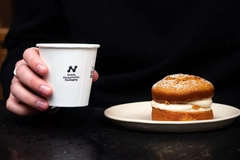Yangi expands dry-formed food packaging with cellulose-based container lid
06 Jun 2024 --- Yangi has extended its dry-formed food packaging product portfolio with a fiber-based container lid. The cellulose-based container lid caters to the packaging needs of dry and ambient food products while aligning with preferences for environmentally conscious options.
The lid is “engineered with circularity in mind” and delivers a “premium tactile experience” with high-resolution customization features available for branding opportunities.
“The lids can be tailored to meet customer specifications regarding shape, size and weight. We offer the option to incorporate unique patterns, debossing and embossing to enhance the consumer experience,” Hanna Rüdel, chief commercial officer at Yangi, tells Packaging Insights.
Retaining material stability, such as through enhanced water and grease resistance, is a significant challenge in the molded fiber sector.
“Most commercially available functional chemicals are designed for wet processes, requiring us to adapt them to our specific dry-forming conditions,” says Anna Altner, founder and head of strategy and investor relations at Yangi.
“To do this, we work closely with chemical suppliers to develop new solutions. Additionally, we are exploring options like liners and lamination. Our results are highly promising, and we have a strong pipeline aimed at introducing innovative concepts in the near future.”
 Yangi dry-molded fiber food container lid.Yangi’s dry-forming manufacturing technology is now ready for machine orders. “Production output will depend on the design, with our Cellera Platform capable of producing around 180 million lids annually,” adds Rüdel.
Yangi dry-molded fiber food container lid.Yangi’s dry-forming manufacturing technology is now ready for machine orders. “Production output will depend on the design, with our Cellera Platform capable of producing around 180 million lids annually,” adds Rüdel.
Knowledge exchange and utility guidance
Cellera, Yangi’s dry-forming manufacturing technology is currently up and running in its 3,000 square meter new “state-of-the-art” production facility in Varberg, Sweden. The site is equipped with a fully industrialized demo machine for large scale demonstrations.
To facilitate the shift to dry-forming, Yangi offers an array of technical support services and training programs that cover product design consultancy. Additionally, it provides subscription-based materials and customized recipes based on its fibers and dry-forming expertise.
“With a robust background in the fiber industry and over a decade of research and development in dry-forming and molding, our team has cultivated extensive expertise in optimizing materials for efficient production, enhancing process conditions and achieving superior product performance,” Altner tells Packaging Insights.
“Our knowledge is one of our greatest assets, and we are committed to expanding it further through collaboration with partners and academia, studying fiber behavior from the nano to the macroscale.”
Rüdel adds that Yangi’s development efforts extend across tailored customer projects in various market segments. “In addition to lids, we are also innovating solutions for the beauty and cosmetics industry, the food sector (ranging from take-away to advanced products) and consumer products like inserts.”
Dry-forming innovation highlights
In other recent advances, alcohol industry giant Diageo began trialing a Dry-Molded Fiber bottle for its Baileys brand, in partnership with PA Consulting as part of the Bottle Collective. The bottle employs PulPac’s technology and is 90% paper-based, with a thin plastic liner and foil seal.
PulPac is also collaborating with OptiPack, a provider of packaging prints and barrier solutions, to explore new options for customized Dry Molded Fiber packaging. This includes a colored and patterned tissue that presents a “unique opportunity” for differentiation.
By Benjamin Ferrer











